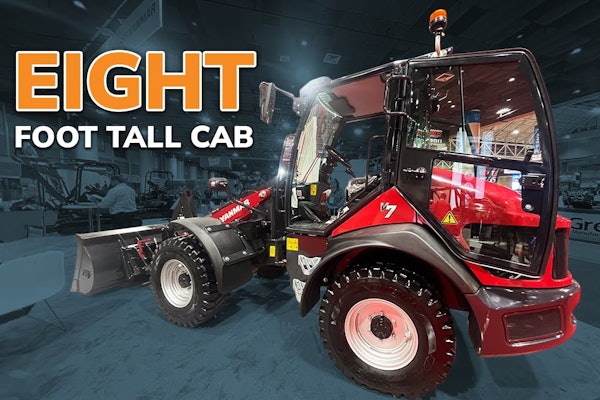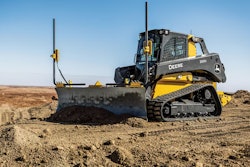Donnie Roebuck doesn’t like to say he came into the construction industry by accident. But he’s hard-pressed to describe his entry into the world of yellow iron in any other way. Roebuck has always been fascinated with machinery and automobiles and earned an aviation maintenance degree after graduating high school in Daytona Beach, Florida.
But aviation wasn’t in the cards for him. While he was in college, Roebuck helped coach a Little League baseball team and became friends with another coach, whose father owned a construction business. This contractor needed a technician to take care of his equipment and truck fleet, and hired Roebuck fresh out of aviation maintenance school to work in and run his shop.
Roebuck enjoyed working in the shop, but over time realized he wasn’t happy. “I knew I wanted more out of life than just working on equipment,” he says now. “Part of it was seeing first-hand the success these contractors were experiencing, and part of it was the realization that I wasn’t pushing myself and growing. I had no incentive. I was just doing what I had to do to get by, and I didn’t like that.”
Around the same time, Roebuck’s coaching friend split off from his father to form his own company. Roebuck felt it was time for him to go too. So he quit his job and went to work driving a concrete truck while he tried to figure out how he could, in his words, “Get his own deal going.”
Opportunity came his way a few months later. His ball-coaching friend called him up seeking advice. His new construction company was considering buying a laser-equipped dozer and wanted Roebuck’s opinion of the machine and the process. “This was 1989,” Roebuck remembers. “Laser dozing was still pretty new. They came by my place with a video – all of 30 seconds long – showing this machine in action, and then asked me what I thought about it.”
Roebuck thought the technology looked pretty solid and asked his friend who was going to run the dozer. “Turns out they wanted to hire me,” Roebuck recalls. But Roebuck was adamant he’d have a stake in the company. So a deal was struck: Roebuck would run the laser dozer for a year as an employee. After that time, if the venture was a success, he would gain a half stake in the grading business. “That’s where Precision Fine Grade – the precursor to Roebuck Construction Services – was born,” Roebuck says.
In his spare time, Roebuck enjoys extreme off-roading with his wife and children. He built this highly modified Jeep Scrambler in his home shop on weekends and nights.
Finding common ground key to resolving disputes
Roebuck’s first job was on Labor Day, 1989. “I butchered it,” he notes with a laugh. “But lucky for me, the guy I was working for understood there was a learning curve. And I was committed to sticking with it and getting things right. I had to learn the art of running that machine: The tricks to getting the corners clean, the ground flat and how to turn without leaving tracks.”
Precision Fine Grade was a success. So much so, that in 1997, Roebuck bought his partners out and founded Roebuck Construction Services. “We were expanding,” he explains. “Precision Fine Grade remains an important aspect of our company, but we also started an excavation division that’s run by Wayne McCombs – who’s still with me today. Wayne is very knowledgeable about the needs contractors have when they’re working on big jobs. We were able to identify niche areas – pain-in-the-neck-type jobs – many large contractors don’t have the expertise or the equipment to tackle. They get into a jam, they’ve got to resolve a problem right away and they call us. And whatever solution we tell them we’re going to deliver, they’re going to get.”
Roebuck’s excavation services are on call nationally. He’d like to keep his laser grading division working in Florida, but as his reputation has grown, so has demand for his services in other states. He’s seen his revenues grow to $2.5 million in 2003, and has had to steadily expand his staff to meet incoming work. “I have great trust in my people,” he says. “I have to. They often go and operate out of state with very little input from me.
“We couldn’t do what we do without our people and rental equipment. I own five dozers and a ’92 Peterbilt with a lowboy that puts the dozers where they need to be. But the excavation division is operated purely with rental equipment because our needs there change daily. We do everything from light trenching for plumbing contractors to heavy excavation and shoring work – installing vaults, for example.”
Roebuck figures his success is due to a spirit of hardcore determination that pervades his company. “I’ve never ever walked off a job,” he says. “We did a job at Alliance Airport north of Ft. Worth when we were getting started. We were only supposed to be there eight to 10 weeks – but when the fifth month rolled by, we were still working. I lost my shirt on that one. But I told the contractor we’d finish the job, and that’s the end of the story as far as I’m concerned. Eventually, contractors learn that we’ll get the job done right, and be there on time running the best equipment we can find.”
Roebuck insists on hiring dependable, independent-minded workers. “I don’t sit on their shoulders watching every move they make, and I try to pay them more money than they’d make in similar jobs at another company,” he says. “I expect and ask the best from them. And they deliver every time. If we make a mistake, we’re men about it. We admit it and make things right.”
When it comes to dealing with his customers, Roebuck expects his employees to be professional and work hard. If a problem comes up, he deals with it personally. “I’m not a big fan of ‘the customer’s always right,’ because sometimes they’re wrong,” he explains. “But my approach is not to be argumentative – it’s to get to the bottom of the issue and resolve it in a way that satisfies both of us. If we end up in the middle somewhere with a resolution it can be good for them and good for us. That attitude makes it easy for them to pick us on future jobs because they know we shoot straight with them and do exactly what we say we will.”









